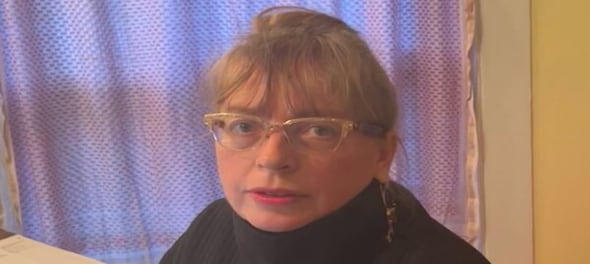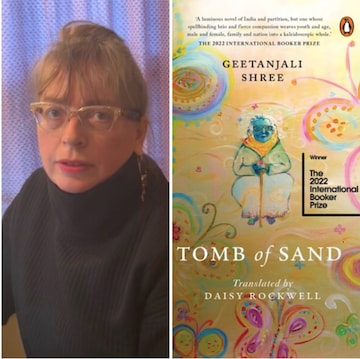
Amid gnawing uncertainty around some scheduled interviews and writers canceling others minutes before the decided time, Daisy Rockwell was a bright glimmer of hope at the 16th edition of the Jaipur Literature Festival, a five-day literary extravaganza which recently concluded in Rajasthan’s vibrant capital.
Still basking in the glory of her International Booker Prize win which she shared with Geetanjali Shree for translating her novel, Ret Samadhi (2018), the first Hindi novel to ever win the honour, Rockwell was unarguably the most accessible literary star at the celebrated festival. We sit in a makeshift booth surrounded by a flurry of noise and activity.
A painter, and translator from Vermont, USA, she talks about her journey of turning Ret Samadhi into Tomb of Sand, why it was important for her to establish a personal equation with Shree, the Bechdel test in writing, why she has stopped translating the works of male authors, essential skills that every translator should be equipped with, her literary diet, and why her work is akin to activism for her.

Q. One thing that has changed since the International Booker win?
A. I have been traveling a lot (laughs). It changes everything. It is such a great honour, such a high-profile award. For both me and Geetanjali, to have attention on not just our work but the traditions that we belong to—for writers in non-English languages in India, translators of South-Asian literatures, it’s very meaningful for both of us to have a big spotlight shining on those traditions and it’s important to us to try to bring everyone else into this spotlight. Some of these literatures date back centuries ago. It’s a big world that’s not really known outside the borders of the subcontinent.
Q. What was the one thing that you found tricky to navigate while translating Ret Samadhi, a novel that’s as rich as it is layered, as philosophical as it is graphic—and it’s written in Hindi, which has its own quirks and a very distinct personality as a language.
A. Geetanjali’s style is very idiosyncratic. She is always experimenting with language, grammar, and storytelling. So, I found that very difficult. Only she could answer my questions when I didn’t understand something. No one else was able to. Even though I don’t think it’s fair to ask an author "why did you do this?" because sometimes they don’t know. It’s instinct and inspiration. But I still had to ask some things, again and again, to try to nail down exactly what she meant and how she meant it. The language was so unconventional.
Q. In your session with Geetanjali Shree, you said you now only translate female authors. Why this decision? Also, what’s the major difference between translating men and women writers?
A. Initially, I didn’t notice that I was translating only men. I thought of myself as somebody who was translating literature that was good. I wasn’t paying attention to gender. But then I started to realise that if you don’t pay attention to gender—there are so few women that get translated—and if you don’t address this inequality, you are probably going to contribute to it.
Also, I was in a phase of translating where I began to realise that in a lot of male writing, women’s experiences are not given any voice. So even if a woman character says anything, they don’t bother to find out why or how she feels about it. A lot of male authors feel they are being feminist when highlighting violence against women in their writing. When I made this switch, that was in 2016, I pulled out my pile of books—I had four by men and four by women—and I started to realize how interesting and how exciting it was to hear women’s voices and them talking about their experiences.
I don’t know if you have heard of the Bechdel test. Discovering it in women’s writing has become a mission of mine. And Tomb of Sand stands up to that test so beautifully. It’s a mother and a daughter talking about their bodies, their lives, their memories, and food. They are rarely talking about men. The deceased father, for instance, you hardly hear a word about that guy. It’s very women-focused and that’s important because it helps us understand women’s experiences.
I do this in my reading too; I try to not read male authors. There is so much misogyny that we don’t realize. If you go on this kind of literary diet, you’ll be shocked to discover how much you put up with the objectification of women, the male gaze, voyeurism, and rape culture that you used to be ignorant about. But you know what, you don’t have to read that stuff. That’s what is exciting to me and it’s still a journey.
Q. It’s been a long process—the writing of this book, the translating, the publishing, the recognition—all of this has taken a while to come together. One story or thought or feeling from all this time that has stayed with you?
A. For both of us, it has been disbelief. Because we are both people who have been working very hard for many years without an expectation of fame. People keep asking me, ‘did you expect this?’ Of course not. Not when she was writing it, not when I was translating it. Sometimes, I re-watch the announcement because I still can’t believe it has happened.
Q. Three skills that you think are absolutely essential for a translator?
A. You need to be very strong in the target language whatever it is. You need to be very patient; it can be quite dull and tedious because you have to go through the same book again and again and again and again. And you should always be ready for at least 10 drafts of anything you translate.
Q. How important is it to have a personal equation with the author?
A. I don’t think you have to but it depends on the nature of the work. Like I could not have translated Ret Samadhi without developing a relationship with Geetanjali. But then, I have translated a lot of deceased authors. So I had to figure it out and make do. But I don’t think this book could have been translated if Geetanjali was not around to answer my questions. For some things, you really need the author.
Q. What kind of projects are you working on now? What is exciting you at the moment?
A. I’m working on a lot of things. I’m translating Geetanjali’s only untranslated novel. It came out in 1998 and it’s called Hamara Shahar Us Baras. It’s situated in a city much like Gujarat in a year much like 1992 and it’s kind of a chronicle of rioting following the demolition of the Babri Masjid. Very overtly political.
I’m also working on a collection of her short stories. For something completely different, I’m working on a 1955 Urdu novel by a Pashtun woman author which, I like to say, is Middlemarch meets The Magic Mountain.
Q. Your work, much like Ret Samadhi, is pointed and direct. At a time when political correctness is greatly valued, you mince no words. Has it been a conscious choice to look for work that’s sharp, visceral, and unafraid?
A. I think of translation as an activist activity; many people don’t. But for me, it is the same with my art. I am always thinking about politics, about what voices get to come out in the public. Translators have this responsibility when they look into other languages and cultures, why are you choosing that work? What do you want to be heard from those voices? Those are very important questions for me.
Q. After the win, is there a greater sense of responsibility now?
I feel a responsibility, as I said, to bring my community with me, to bring south-Asian languages outside the subcontinent. So I feel the responsibility to bring other translators and translations with me.
First Published: Feb 2, 2023 2:26 PM IST
Check out our in-depth Market Coverage, Business News & get real-time Stock Market Updates on CNBC-TV18. Also, Watch our channels CNBC-TV18, CNBC Awaaz and CNBC Bajar Live on-the-go!


2024 Lok Sabha Election | Which way the wind blows in the second phase
Apr 26, 2024 6:09 PM
Election Commission registers case against BJP's Tejasvi Surya for alleged violation of poll code
Apr 26, 2024 5:08 PM

